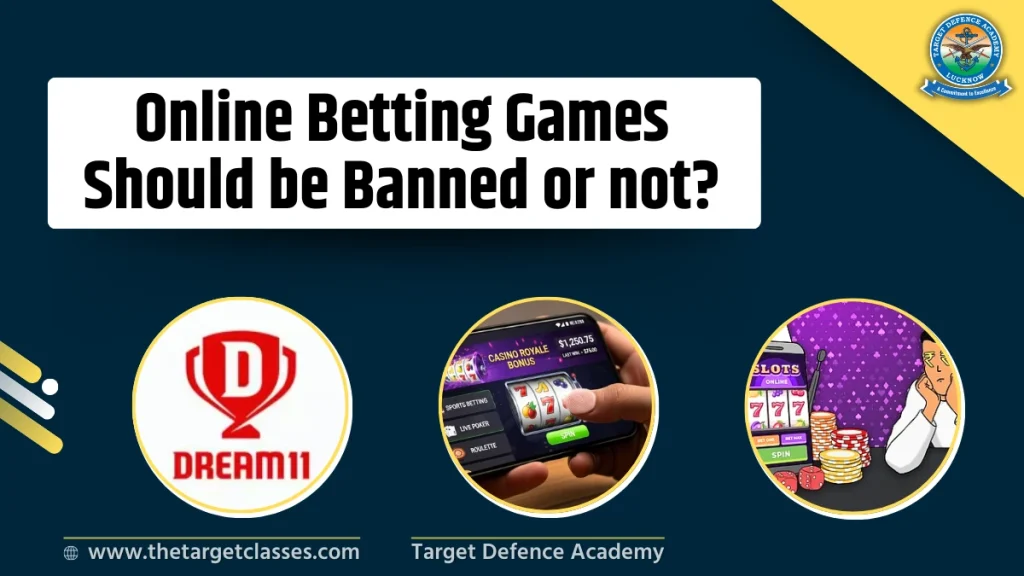Context
Of late, both the houses of parliament of India passed the ‘Promotion and Regulation of Online Gaming Bill, 2025. It aims to restrict addiction, financial loss and social distress caused by such gaming platforms. As they keep promoting misleading promises of quick wealth. Here, we have discussed in detail whether Online Betting Games should be banned or not.

Need for Ban / Regulation
India’s Online Betting Games sector is booming – with over 650 million smartphone users, a youthful population, and a rapidly growing digital economy.
(i) MeitY data: (i) More than forty-five crore Indians negatively impacted by such games.
(ii) An estimated ₹20,000 crore in financial losses have occurred due to unregulated platforms.
(iii) Cases of suicide, addiction, and family distress have a link with compulsive gaming.
(ii) Economic Gaps: (i) The sector will reach ₹66,000 crore by 2028, growing at 14.5% CAGR.
(ii) Illegal offshore betting markets get a hundred billion dollars every year from India, resulting in a loss of around 45 billion dollars in tax revenue.
(iii) Money Laundering Threat: Online money gaming platforms – often operating in legal grey zones – enabled:
(i) Untraceable financial transactions, especially via offshore accounts and cryptocurrencies.
(ii) False promises of profit, luring users into high-stakes betting.
(iv) Social & Psychological Harm: The World Health Organisation (WHO) classifies gaming disorder as a health condition, marked by:
(i) Loss of control over gaming habits; (ii) Avoiding routine activities; (iii) Continued play despite harmful consequences.
Concerns and Consequences of a Ban
(I) Significant Revenue Loss: The government will suffer a significant loss in tax revenue. Earlier, a 28% (GST) was there on the entire amount players staked, not just their winnings. This revenue canal will now plummet to zero.
(ii) Disrupted Investment and Job Market: This sector has attracted substantial domestic and foreign direct investment. The ban, along with policy uncertainty, will hinder new investments and ruin existing capital. As a result, job losses for software engineers, game designers, and customer support teams will be there in this highly expanding sector.
(iii) Impact on the Sports Economy: Online gaming companies were big advertisers for high-profile sports events, notably the Indian Premier League (IPL). The ban will devastate the sports economy’s ad revenue.
(iv) Outflow of Business and Rise of Black Markets: Now, this ban will take the business out of the country. Players will use foreign applications, more likely via VPNs, or engage in illegal black market activities. This will send the money out of the borders, and the government will not have any control over this. All this will make the situation worse.
(v) Inconsistent Regulatory Approach: A perceived paradox exists in the current regulatory landscape. While online money games are banned, lotteries remain legal in states like Kerala. Casinos are running in Goa and Sikkim, and horse racing bets are legal nationwide (a game of skill by the Supreme Court). This inconsistency raises questions about the selective application of bans. The market size of this industry is also substantial, estimated at over ₹20,000 crore.
Download the Mobile App of Target Defence Academy
Best NDA Coaching in Lucknow | Top Defence Coaching in Lucknow
Way Forward
(i) Middle ground: Need to explore a middle ground involving stricter regulation, just like “sin goods” like cigarettes and alcohol. These products are dangerous but not banned; rather, more taxes and regulations are there on them.
(ii) Age Restrictions: Strict enforcement of age limits, ensuring only individuals aged 18 and above can participate.
(iii) Robust KYC Norms: Mandatory Know Your Customer (KYC) procedures to verify user identities.
(iv) Spending Limits: Restricting the daily, weekly or monthly spending to limit huge losses.
(v) Self-Exclusion Options: Providing users with the ability to self-block themselves from gaming apps for specified periods.
(vi) Awareness Campaigns: Aware citizens through awareness campaigns to educate them about the risks and responsible gaming.
(vi) National Online Gaming Commission: Formulate a regulatory body/commission whose work will be to provide licenses, monitor the industry and ensure that no illegal activities take place. Heavy penalties and stricter punishments for violations of the regulations for Online Betting Games.
Conclusion
By going with such a regulated approach, the dispensation will be able to address the concerns of protecting vulnerable citizens while ignoring the negative impacts. There could be various other problems, but on a larger scale and for the national interest, it is a need of the hour. This would allow for a dynamic framework that learns and adapts with the flow of time.

